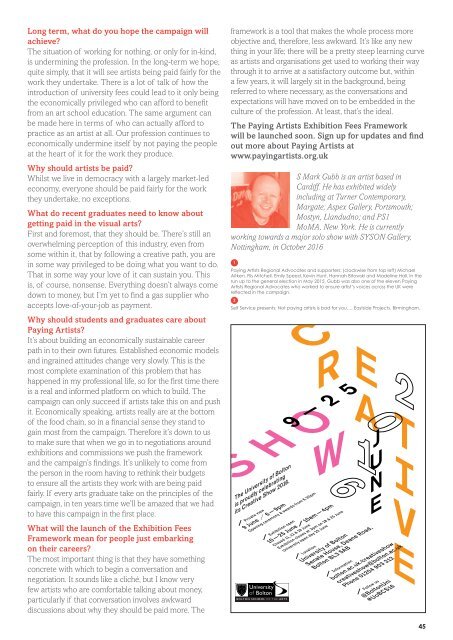Degree Shows Guide 2016
1WUYUmN
1WUYUmN
Create successful ePaper yourself
Turn your PDF publications into a flip-book with our unique Google optimized e-Paper software.
Long term, what do you hope the campaign will<br />
achieve?<br />
The situation of working for nothing, or only for in-kind,<br />
is undermining the profession. In the long-term we hope,<br />
quite simply, that it will see artists being paid fairly for the<br />
work they undertake. There is a lot of talk of how the<br />
introduction of university fees could lead to it only being<br />
the economically privileged who can afford to benefit<br />
from an art school education. The same argument can<br />
be made here in terms of who can actually afford to<br />
practice as an artist at all. Our profession continues to<br />
economically undermine itself by not paying the people<br />
at the heart of it for the work they produce.<br />
Why should artists be paid?<br />
Whilst we live in democracy with a largely market-led<br />
economy, everyone should be paid fairly for the work<br />
they undertake, no exceptions.<br />
What do recent graduates need to know about<br />
getting paid in the visual arts?<br />
First and foremost, that they should be. There’s still an<br />
overwhelming perception of this industry, even from<br />
some within it, that by following a creative path, you are<br />
in some way privileged to be doing what you want to do.<br />
That in some way your love of it can sustain you. This<br />
is, of course, nonsense. Everything doesn’t always come<br />
down to money, but I’m yet to find a gas supplier who<br />
accepts love-of-your-job as payment.<br />
Why should students and graduates care about<br />
Paying Artists?<br />
It’s about building an economically sustainable career<br />
path in to their own futures. Established economic models<br />
and ingrained attitudes change very slowly. This is the<br />
most complete examination of this problem that has<br />
happened in my professional life, so for the first time there<br />
is a real and informed platform on which to build. The<br />
campaign can only succeed if artists take this on and push<br />
it. Economically speaking, artists really are at the bottom<br />
of the food chain, so in a financial sense they stand to<br />
gain most from the campaign. Therefore it’s down to us<br />
to make sure that when we go in to negotiations around<br />
exhibitions and commissions we push the framework<br />
and the campaign’s findings. It’s unlikely to come from<br />
the person in the room having to rethink their budgets<br />
to ensure all the artists they work with are being paid<br />
fairly. If every arts graduate take on the principles of the<br />
campaign, in ten years time we’ll be amazed that we had<br />
to have this campaign in the first place.<br />
What will the launch of the Exhibition Fees<br />
Framework mean for people just embarking<br />
on their careers?<br />
The most important thing is that they have something<br />
concrete with which to begin a conversation and<br />
negotiation. It sounds like a cliché, but I know very<br />
few artists who are comfortable talking about money,<br />
particularly if that conversation involves awkward<br />
discussions about why they should be paid more. The<br />
framework is a tool that makes the whole process more<br />
objective and, therefore, less awkward. It’s like any new<br />
thing in your life; there will be a pretty steep learning curve<br />
as artists and organisations get used to working their way<br />
through it to arrive at a satisfactory outcome but, within<br />
a few years, it will largely sit in the background, being<br />
referred to where necessary, as the conversations and<br />
expectations will have moved on to be embedded in the<br />
culture of the profession. At least, that’s the ideal.<br />
The Paying Artists Exhibition Fees Framework<br />
will be launched soon. Sign up for updates and find<br />
out more about Paying Artists at<br />
www.payingartists.org.uk<br />
S Mark Gubb is an artist based in<br />
Cardiff. He has exhibited widely<br />
including at Turner Contemporary,<br />
Margate; Aspex Gallery, Portsmouth;<br />
Mostyn, Llandudno; and PS1<br />
MoMA, New York. He is currently<br />
working towards a major solo show with SYSON Gallery,<br />
Nottingham, in October <strong>2016</strong><br />
1<br />
Paying Artists Regional Advocates and supporters: (clockwise from top left) Michael<br />
Aitken, Flis Mitchell, Emily Speed, Kevin Hunt, Hannah Bitowski and Madeline Hall. In the<br />
run up to the general election in May 2015, Gubb was also one of the eleven Paying<br />
Artists Regional Advocates who worked to ensure artist’s voices across the UK were<br />
reflected in the campaign.<br />
2<br />
Self Service presents: Not paying artists is bad for you…, Eastside Projects, Birmingham.<br />
The University of Bolton<br />
is proudly celebrating<br />
its Creative Show <strong>2016</strong>.<br />
Private view<br />
9 June 6 — 9pm<br />
Opening ceremony & awards from 6.30pm<br />
Exhibition open<br />
10 — 25 June 10am — 4pm<br />
Closed 11, 12 & 19 June<br />
Exhibition closes at 3pm on 18 & 25 June<br />
University open day 25 June<br />
Location<br />
University of Bolton<br />
Senate House, Deane Road,<br />
Bolton BL3 5AB<br />
Information<br />
bolton.ac.uk/creativeshow<br />
creativeshow@bolton.ac.uk<br />
Phone 01204903312<br />
Follow us<br />
@BoltonUni<br />
#UoBCS16<br />
45


